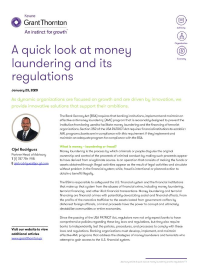-
Financial statements audits
Financial statement audits
-
Compliance audits
Compliance audits
-
Compilations and reviews
Compilations and audit
-
Agreed-upon procedures
Agreed-upon procedures
-
Corporate and business tax
Our trusted teams can prepare corporate tax files and ruling requests, support you with deferrals, accounting procedures and legitimate tax benefits.
-
International tax
Our teams have in-depth knowledge of the relationship between domestic and international tax laws.
-
Tax compliance
Business Tax
-
Individual taxes
Individual taxes
-
Estate and succession planning
Estate and succession planning
-
Global mobility services
Through our global organisation of member firms, we support both companies and individuals, providing insightful solutions to minimise the tax burden for both parties.
-
Sales and use tax and indirect taxes
SUT/ VAT & indirect taxes
-
Tax incentives program
Tax incentives program
-
Transfer Pricing Study
The laws surrounding transfer pricing are becoming ever more complex, as tax affairs of multinational companies are facing scrutiny from media, regulators and the public
-
Business consulting
Our business consulting services can help you improve your operational performance and productivity, adding value throughout your growth life cycle.
-
Forensic and investigative services
At Grant Thornton, we have a wealth of knowledge in forensic services and can support you with issues such as dispute resolution, fraud and insurance claims.
-
Fraud and investigations
The commercial landscape is changing fast. An ever more regulated environment means organizations today must adopt stringent governance and compliance processes. As business has become global, organizations need to adapt to deal with multi-jurisdictional investigations, litigation, and dispute resolution, address the threat of cyber-attack and at the same time protect the organization’s value.
-
Dispute resolutions
Our independent experts are experienced in advising on civil and criminal matters involving contract breaches, partnership disputes, auditor negligence, shareholder disputes and company valuations, disputes for corporates, the public sector and individuals. We act in all forms of dispute resolution, including litigation, arbitration, and mediation.
-
Business risk services
We can help you identify, understand and manage potential risks to safeguard your business and comply with regulatory requirements.
-
Internal audit
We work with our clients to assess their corporate level risk, identify areas of greatest risk and develop appropriate work plans and audit programs to mitigate these risks.
-
Service organization reports
As a service organization, you know how important it is to produce a report for your customers and their auditors that instills confidence and enhances their trust in your services. Grant Thornton Advisory professionals can help you determine which report(s) will satisfy your customers’ needs and provide relevant information to your customers and customers’ auditors that will be a business benefit to you.
-
Transaction advisory services
Transactions are significant events in the life of a business – a successful deal that can have a lasting impact on the future shape of the organizations involved. Because the stakes are high for both buyers and sellers, experience, determination and pragmatism are required to bring deals safely through to conclusion.
-
Mergers and acquisitions
Globalization and company growth ambitions are driving an increase in M&A activity worldwide as businesses look to establish a footprint in countries beyond their own. Even within their own regions, many businesses feel the pressure to acquire in order to establish a strategic presence in new markets, such as those being created by rapid technological innovation.
-
Valuations
We can support you throughout the transaction process – helping achieve the best possible outcome at the point of the transaction and in the longer term.
-
Recovery and reorganization
We provide a wide range of services to recovery and reorganisation professionals, companies and their stakeholders.
As dynamic organizations are focused on growth and are driven by innovation, we provide innovative solutions that support their ambitions.
The Bank Secrecy Act (BSA) requires that banking institutions, implement and maintain an effective anti-money laundering (AML) program that is reasonably designed to prevent the institution from being used to facilitate money laundering and the financing of terrorist organizations. Section 352 of the USA PATRIOT Act requires financial institutions to establish AML programs; banks are in compliance with this requirement if they implement and maintain an adequate program for compliance with the BSA.
What is money – laundering or fraud?
Money laundering is the process by which criminals or people disguise the original ownership and control of the proceeds of criminal conduct by making such proceeds appear to have derived from a legitimate source. Is an operation that consists of making the funds or assets obtained through illegal activities appear as the result of legal activities and circulate without problem in the financial system; while, fraud is intentional or planned action to obtain a benefit illegally.
The BSA is responsible to safeguard the U.S. financial system and the financial institutions that make up that system from the abuses of financial crime, including money laundering, terrorist financing, and other illicit financial transactions. Money laundering and terrorist financing are financial crimes with potentially devastating social and financial effects. From the profits of the narcotics trafficker to the assets looted from government coffers by dishonest foreign officials, criminal proceeds have the power to corrupt and ultimately destabilize communities or entire economies.
Since the passing of the USA PATRIOT Act, regulators now not only expect banks to have comprehensive policies regarding these key laws and regulations, but they also require banks to independently test the policies, procedures, and processes to comply with these laws and regulations. Banking organizations must develop, implement, and maintain effective AML programs that address the strategies of money launderers and terrorists who attempt to gain access to the U.S. financial system.
How does money laundering work?
The money laundering involved three stages:
- Placement - put the false money into a financial system that seems legal or real. Include structuring currency deposits in amounts to evade reporting requirements.
- Layering - is the phase where money is hidden with specific transactions that seem real. Involves moving funds around the financial system.
- Integration - final stage; the money is withdrawn from the legitimate account and used for any purposes.
Causes or facts for money laundering
Several causes can promote the occurrence of money laundering, as follows:
- Lack of transparency – not having a culture of accountability and transparency could have the potential to promote criminal practices like the laundering of money.
- Lack of good governance – good governance include accountability, avoidance of corruption and strong regulation. If employees or politicians promote values contrary to good governance, more people around them will likely launder money.
- Lack of strong monitoring systems – individuals are more likely to launder money if the opportunities of evading punishment are high. Failing to implement compliance measures can promote financial crime, since it incentivizes the wrongdoing. Institutions regulated by the BSA must have risk assessments, due diligence and monitoring systems in place within their organizations.
Examiners must review the bank’s BSA/AML compliance program in order to determine whether their BSA/AML compliance program is adequate and provides the controls necessary to mitigate risks. Failing to comply with AML and counter terrorism financing laws and regulations can result in severe fines and penalties for the organization.
How Kevane Grant Thornton can help
To address this regulatory requirement businesses in the banking industry seeks advisory services from Kevane Grant Thornton to assist with the independent assessment in their compliance, effectiveness, and soundness with respect to applicable laws and regulations promulgated by the federal government and federal and state agency partners relating to its AML compliance program.
We are committed to keep you updated of all developments that may affect the way you do business in Puerto Rico.


